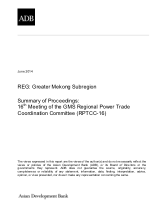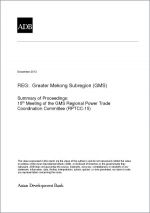
Greater Mekong Subregion Strategic Framework 2012–2022
The Greater Mekong Subregion Strategic Framework 2012–2022 builds on the substantial progress the GMS program has made and the likely global and regional trends.

The Greater Mekong Subregion Strategic Framework 2012–2022 builds on the substantial progress the GMS program has made and the likely global and regional trends.

With increasing fuel demand projected for the Greater Mekong Subregion, biofuels could make a significant contribution to offsetting oil demand and to increased agricultural and rural incomes.

A more integrated, harmonious, prosperous, and equitable Greater Mekong Subregion requires agriculture to be the lead contributing sector. Regional cooperation in the agriculture sector is guided by the Core Agriculture Support Program (CASP), which is implemented by the Working Group on Agriculture.
Under CASP Phase I (2006-2010), GMS member countries expanded agriculture trading, resulting in sizable gains in the global market.

This is the statement issued by the Joint Committee for the Cross-Border Transport Facilitation Agreement during its fourth meeting in Nay Pyi Taw, Myanmar on 22 November 2013.

Ministers from the governments of Cambodia, the People’s Republic of China, the Lao People’s Democratic Republic, Myanmar, Thailand, and Viet Nam, met in Vientiane, Lao PDR on 11 December 2013 for the 19th Ministerial Conference of the Greater Mekong Subregion Economic Cooperation Program.
The Forum was jointly organized by the Ministry of Transport (MOT) of Thailand and the Asian Development Bank (ADB).
This is the joint statement from the 4th Greater Mekong Subregion Tourism Ministers' Meeting in Vientiane, Lao People's Democratic Republic on 20 January 2013.

The 16th Meeting of the Regional Power Trade Coordination Committee (RPTCC-16) was held to (i) open and commence the evaluation of the bids for the venue for the headquarters of the Regional Power Coordination Center (RPCC) which will serve as a permanent institution to enhance regional power trade and implement regional power interconnection in the GMS; (ii) provide updates on the Greater Mekong Subregion (GMS) countries’ power development plans focusing on cross-border projects;

The Second Meeting of the Urban Development Task Force held in Kunming City from 14–15 November 2013 was undertaken with the objective of further strengthening regional cooperation in the urban development sector and stimulating integration and competitiveness of GMS corridor towns and border areas.

This paper summarizes the proceedings of the Fifteenth Meeting of the GMS Regional Power Trade Coordinating Committee in Da Nang, Viet Nam, on 16-17 December 2013.